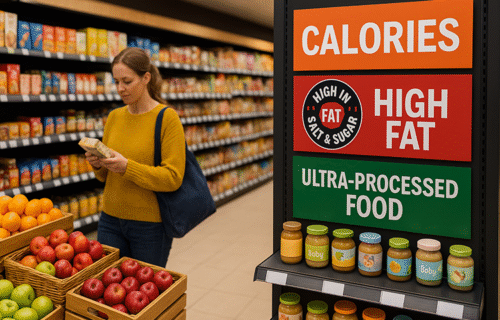The UK is reshaping its food and drink regulation with an increasing focus on public health, nutrition, and consumer awareness. Both England and Scotland have unveiled long-term strategies to reform the food system, backed by measures ranging from restrictions on unhealthy product promotion to tighter scrutiny of baby foods and ultra-processed products.
England’s Fit for the Future strategy, published in July 2025, sets out plans to restrict junk food advertising aimed at children, ban high-caffeine energy drinks for under-16s, and give local councils greater authority to block fast-food outlets near schools. The plan also introduces mandatory healthy food sales reporting for large companies by the end of the parliamentary term. Central to the reforms is an update of the Nutrient Profile Model, first developed in 2004, which underpins restrictions on high fat, salt and sugar (HFSS) product promotions.
Scotland has launched its Population Health Framework 2025–2035 alongside the National Good Food Nation Plan. Early measures focus on preventative action, including reformulating foods to reduce fat, sugar, and salt content, supporting healthy school meals, and working with retailers to improve consumer shopping baskets.
Both nations are advancing restrictions on HFSS promotions. England’s Food (Promotion and Placement) Regulations 2021 already limit multi-buy deals and product placement in stores and online, while new advertising regulations taking effect from January 2026 will ban TV adverts for unhealthy foods before 9pm and restrict paid-for online promotion. Scotland is preparing similar rules after a 2024 consultation. Local authorities will be tasked with enforcement, reflecting efforts to curb obesity-related illnesses, which remain among the leading causes of preventable disease.
Mandatory calorie labelling is already in force for large food outlets in England, and Scottish policymakers are weighing comparable measures. Advocates argue calorie data empowers consumers, though campaigners caution against unintended effects for vulnerable groups, including those with eating disorders.
Regulation is also widening to cover emerging risks. Ultra-processed foods (UPFs), which account for an estimated 57% of the UK diet, are under growing scrutiny following research linking high consumption to obesity and cardiovascular disease. While no UK laws specifically regulate UPFs, the Scientific Advisory Committee on Nutrition’s April 2025 review acknowledged mounting evidence of harm and recommended further research to determine causality.
Food colourings are another area under review. The UK has required warning labels on certain artificial dyes since 2010, leading many producers to switch to natural alternatives. Meanwhile, the US Food and Drug Administration has banned Red Dye No.3 from 2027 after studies suggested a cancer risk. Although the dye is not widely used in the UK, the move is expected to accelerate reformulation for products sold across both markets.
Concerns over the nutritional quality of baby foods have prompted the UK government to issue voluntary guidelines for manufacturers, targeting reductions in sugar and salt without the use of sweeteners. Companies have until February 2027 to meet these targets, after which mandatory measures may follow.
Taken together, these measures mark a clear policy shift toward a health-focused food environment. For food and drink businesses, the implications are significant: tighter advertising and placement rules, greater labelling obligations, and mounting pressure to reformulate. Industry observers note that beyond compliance, companies will need to align more closely with public health priorities and consumer expectations.
The direction of travel is clear. As policymakers in England and Scotland implement these frameworks, the UK food sector faces a decade defined by stricter health standards, greater transparency, and growing scrutiny of the links between diet and disease.
Source: CMS
